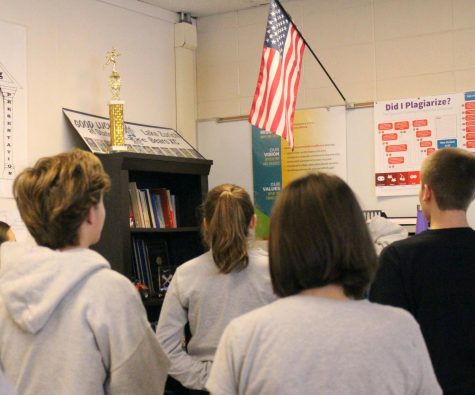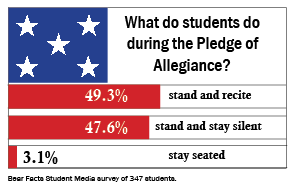To pledge or not to pledge
Photo by Photo by Ellie Melvin
Students begin the day with one hand over their heart and eyes up on the star spangled banner.
Forty-nine point three percent of students choose to participate in the Pledge of Allegiance during the daily announcements, according to Bear Facts Student Media survey of 347 students. Students born in countries other than the United States sometimes feel that loyalty or adopted nationalism impacts their actions during the Pledge.
“I do stand [for the Pledge of Allegiance], but that’s only to be respectful to other people,” Brynn Nelson, junior from Canada, said. “I don’t want to pledge to a flag or country that’s not my own.”
Nelson moved to Lake Zurich three years ago at the start of eighth grade, but her allegiance still lies with Canada. Nelson remembers the first time she heard the Pledge of Allegiance during the morning announcements at her middle school.
“Everyone stood up, [and] that’s all I remember about it,” Nelson said. “No one [had] told me, and [my classmates and teacher] all just started saying the same thing, and it kind of scared me.”
Nelson never stood for the Pledge that year and only began doing so as a freshman out of respect for her peers’ participation. The oath is simply not important to her personally since she believes it is meant for Americans, Nelson said.

Freshmen in Courtney May’s, english teacher, third period Honors I English class recite the Pledge of Allegiance with the morning announcements. Free speech is a right students exercise daily while choosing to whether or not participate in the oath.
A student’s country of origin does not always influence their participation or even their opinion of the pledge. 87.8 percent of LZHS students born outside the U.S. feel their nationality does not impact their actions during the daily proclamation, according to Bear Facts Student media survey of 90 students. Nathan Bejnarowicz, freshman, was born in Chiddingfold, England but recites the American pledge every morning.
“I feel like it’s important to have faith and nationalism [and] to have an understanding and appreciation for where you’re living and what conditions you’re living in,” Bejnarowicz said. “I wouldn’t say [my country of origin influences my opinion]. As long as I have food and shelter, [where I am living] is a good place.”
Bejnarowicz moved to the United States at just four years old, and though he remembers he found the Pledge strange the first time, it is now a regular part of his school day.
Students are free to decide for themselves whether they stand, sit, speak, or stay silent during the Pledge of Allegiance. It has never been mandated that students participate in the Pledge of Allegiance at school, only set as standard conduct, according to Bo Vossel, principal.
“I think that that’s part of what we’ve based our entire nation’s rights upon, is that idea of you have a right to free speech and free expression,” Vossel said.
That idea of guaranteed freedom carries over into the classroom every morning in the form of student choice.
“For me, [the option is important] because I’m not from this country,” Nelson said. “So if I wasn’t given the choice, I would probably be upset about that.”

The history teacher’s take
“We are a country that obviously values education, so that’s [something] we get to participate in, that educational process, I guess,” David Voss, history teacher, said. “[The Pledge of Allegiance is] a nice reminder, kind of a segway into being an American history teacher. It has a nice little bridge into what we’re doing.”
Voss’ perspective is relative to his own position as a teacher, he says, but he recognizes the Pledge’s diverse interpretation among others.
“Part of what [the Pledge of Allegiance] represents is that idea that people have the freedom to make something like that [oath] mean to them whatever [they want] it to mean, whether that means patriotism, whether that means honoring veterans, [or] whether that means representing the successes of America.”
The exchange student’s view
Alice Draghici, sophomore, moved from Romania to America as an exchange student last year.
“First, I was confused why everybody said [the Pledge of Allegiance in school] every single day,” Draghici said. “But [later on] I understood because everyone said that it’s a tradition for American people.”
The tradition is one that Draghici takes part in. Each morning, she stands and recites the Pledge, mostly because her peers do, but Draghici also views the tradition as a unifying experience.
“[The Pledge] is something nice and respectful. And everybody who comes to this country, they have determination and everything,” Draghici said. “So I think it’s nice to [have that unity when saying the Pledge in] this country.”
The same sense of unity is why Draghici finds it important that students have the opportunity to participate in the Pledge of Allegiance.
“It’s important for the students [to have the opportunity] because everyone who comes here, or even if they are from here, they act together.”

